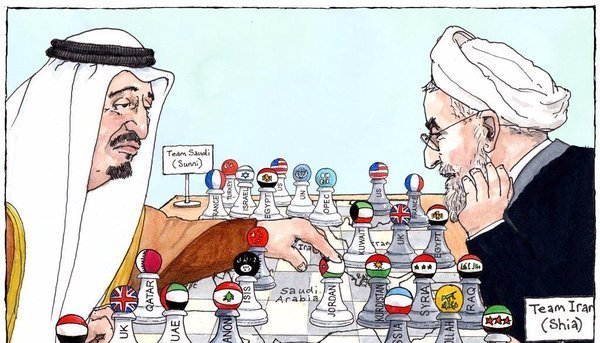Al-Sabah Al-Yemeni
Recent moves by Saudi Arabia and the United Arab Emirates suggest that the two Gulf States may be looking for ways to reduce tensions with Iran that permeate multiple conflicts wracking the Middle East and North Africa.
The moves, including a rapprochement with Iraq and a powerful Iraqi Shiite religious and political leader as well as prosecution of a militant Saudi cleric on charges of hate speech, and leaked emails, point towards a possible willingness to engage with Iran more constructively. A dialling down of Saudi-Iranian tensions could contribute to a reduction of tensions across the Middle East and North Africa.
At the same time, however, a series of statements and developments call into question how serious Saudi Arabia and the UAE may be about a potential rapprochement with Iran. Further complicating matters, is the fact it is unclear who is driving a potential overture to Iran, Saudi Crown Prince Mohammed bin Salman or his UAE counterpart, Crown Prince Mohammed bin Zayed.
The UAE, although much smaller in size and population than Saudi Arabia, has been a, if not the driver, of recent events in the Middle East and North Africa, including the ill-fated two-month old diplomatic and economic boycott of Qatar and developments in the war in Yemen.
Leaked email traffic between the UAE ambassador to Washington, Yousef al-Otaiba, and three former US officials, Martin Indyk, who served in the Clinton and Obama administrations, Stephen Hadley, former President George W. Bush’s national security advisor, and Elliott Abrams who advised Presidents Bush and Ronald Reagan, as well as with Washington Post columnist David Ignatius lay bare the UAE strategy of working through Saudi Arabia to achieve its regional goals.
Mr. Abrams quipped about the UAE’s newly-found assertiveness in a mail to Mr. Al-Otaiba: “Jeez, the new hegemon! Emirati imperialism! Well if the US won’t do it, someone has to hold things together for a while.” Mr. Al-Otaiba responded: “Yes, how dare we! In all honesty, there was not much of a choice. We stepped up only after your country chose to step down,” a reference to perceptions that President Barak Obama had been disengaging from the Middle East.
Discussing the UAE’s relationship with Saudi Arabia and Prince Mohammed, Mr. Al-Otaiba went on to tell Mr. Abrams that “I think in the long term we might be a good influence on KSA (Kingdom of Saudi Arabia), at least with certain people there. Our relationship with them is based on strategic depth, shared interests, and most importantly the hope that we could influence them. Not the other way around.”
In his exchange with Mr. Indyk as well as Mr. Ignatius, Mr. Al-Otaiba, who had been promoting the Saudi prince in Washington for the past two years, was unequivocal about UAE backing of the likely future king as an agent of change who would adopt policies advocated by the UAE.
“I think MBS is far more pragmatic than what we hear is Saudi public positions,” Mr. Al-Otaiba said in one of the mails, referring to Prince Mohammed by his initials. I don’t think we’ll ever see a more pragmatic leader in that country. Which is why engaging with them is so important and will yield the most results we can ever get out of Saudi,” the ambassador said. “Change in attitude, change in style, change in approach,” Mr. Al-Otaiba wrote to Mr. Ignatius.
The exchanges gave credence to suggestions that Saudi Arabia and the UAE may be seeking a reduction of tension with Iran. Yet, they occurred before the Gulf crisis erupted in which Saudi Arabia and the UAE demanded, among other things, that Qatar reduce its relations with Iran.
Describing a meeting with Saudi Prince Mohammed in an email to Mr. Al-Otaiba dated April 20, Mr. Indyk recounted that the prince “was quite clear with Steve Hadley and me that he wants out of Yemen and that he’s ok with the US engaging Iran as long as it’s coordinated in advance and the objectives are clear.”
At first glance, Prince Mohammed’s position, expressed prior to US President Donald J. Trump’s landmark visit to the kingdom in May and the Gulf crisis, clashes with Mr. Trump’s efforts to find a reason not to certify Iranian compliance with the two-year old nuclear agreement that led to the lifting of international sanctions against the Islamic republic. Under the agreement, Mr. Trump must certify to the US Congress Iranian compliance every three months and is next due to do so in October.
The devil being in the details, the key phrase in Prince Mohammed’s remarks is the demand that “the objectives are clear.” The emails did not spell out what the prince met. Senior Saudi officials have repeatedly demanded that Iran halt its intervention in Syria and Iraq as well as its support for groups such as Lebanese militia Hezbollah and Houthi in Yemen – demands Iran is unlikely to accept.
Mr. Indyk’s description of Prince Mohammed’s endorsement of US engagement with Iran also contrasted with the Saudi official’s framing of his country’s rivalry with Iran in sectarian terms in an interview on Saudi television in May. Prince Mohammed asserted in the interview that there could be no dialogue with Iran because it was promoting messianic Shiite doctrine.
And Amid the fog of contradictory moves, it seems that it will be a Saudi-Iranian rivalry that has complicated in the next phase, if not exacerbated, the Middle East’s multiple conflicts.
خليك معنا

